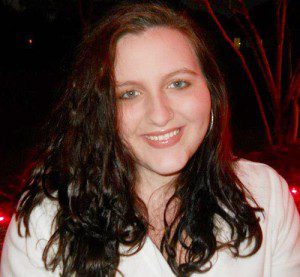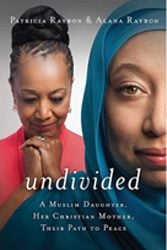Patricia and Alana Raybon found themselves enraptured in the new American story: an interfaith family. Patricia, a devout Christian, struggles to accept her daughter’s chosen faith, Islam. Alana, a ten-year revert, wants her mother to accept her and her faith and respect her choices. Painfully honest and unafraid to address harsh subjects, Undivided: A Muslim Daughter, Her Christian Mother, Their Path to Peace tells a story that has become more and more common in the United States.
From the first page, I found myself utterly engaged in Patricia and Alana’s struggles to find peace in their relationship. Faith is a complicated matter, but faiths that demand certain beliefs to enter paradise complicate the matter further. Patricia often writes how she wishes Alana would return to Christ; she berates herself for those comments, but her desire doesn’t change. She whole-heartedly believes Christ is the only way to salvation, and she prays her daughter will return to the fray.
Alana never expresses a desire for her mother to convert to Islam, instead she wishes her mother would respect her individual autonomy of choice and the choices she has made. Alana has found peace and contentment within Islam with her husband, Iesa, and their three young children. Throughout, she expresses her frustration with her mother and her desire to be seen as more than a person who left the faith and ripped apart her family. Above all, she wants to honor Allah and follow her heart.
With the prominence of Islam in world news, Patricia would ask her daughter about events and Alana would often angrily rebuff. Alana writes, “I didn’t choose Islam for the people,” and expresses her weariness at having to defend each action performed by Muslims worldwide. Patricia acknowledges her superiority complex, often talking as if Islam has been a confirmed fraud, but tries to remain open and understanding with her daughter.
Alana and Patricia’s differing viewpoints on the nature of God and the divinity of Jesus make them clash frequently. With their compelling storytelling abilities, I felt Patricia’s pain and Alana’s frustration, and I wanted to embrace them both and say, “It’s going to be okay. You’re going to be okay.”
The two express their desire of peace and togetherness, but they understand the reality of their situation. Patricia cannot make eliminate her desire for her daughter to return to Christianity. Alana cannot sacrifice her faith to reunite a family that has been divided. Instead, they try to treat each other with grace and learn to forgive each other and themselves.
With growing religious pluralism, more and more families will experience a son or daughter leaving the religion of their parents to pursue their own path. This book can most certainly be helpful to others while they struggle through conflicts of religion. Alana and Patricia do not sugarcoat their feelings or try to downplay their conflicts. They openly discuss their arguments and the pain they feel while trying to coexist. Interfaith dynamics and family politics merge for an unfortunately difficult product. Together, Patricia and Alana learn that peace must be created and constantly tended to and that they must remain conscious of themselves and each other to retain the uneasy peace between them.
While reading the book, I grew conscious of some similarities between my own mother and me. Although we haven’t had arguments over religion, the conflicts between parents and their adult children are woefully common. Parents want to parent their children forever; they believe they know best and want to encourage their children to follow a path the parent deems safe and good. Adult children often feel like they are beyond parenting and want to be seen as equals, as fully-functional adults without need of guidance.
I kept hoping there would be a moment where the two finally resolved their differences and the family reunited with joyous celebration. I had to go without that ideal, but, ultimately, that’s for the best. Stories like these often don’t have happy endings. Alana and her mother were never going to join hands and shout out their acceptance and joy at each other’s chosen faiths. Their story isn’t a story of joy and reconciliation; they tell the story of two worlds joining together for uneasy peace with hope for continued dialogue and growth.
These conflicts cannot be prevented, but they can be handled respectfully and with kindness. Alana and Patricia learn that they’ll never agree on their religious beliefs, but they can agree to love each other. And that’ll be enough for now.
Read an excerpt from Undivided at the Patheos Book Club here.
 Holly Baer is a summer intern at Patheos. She grew up in Flowood, Mississippi and is an alum of the Mississippi School for Math and Science. She studies religion and gender studies at the University of Mississippi and writes her own blog at HollyBaer.com.
Holly Baer is a summer intern at Patheos. She grew up in Flowood, Mississippi and is an alum of the Mississippi School for Math and Science. She studies religion and gender studies at the University of Mississippi and writes her own blog at HollyBaer.com.













